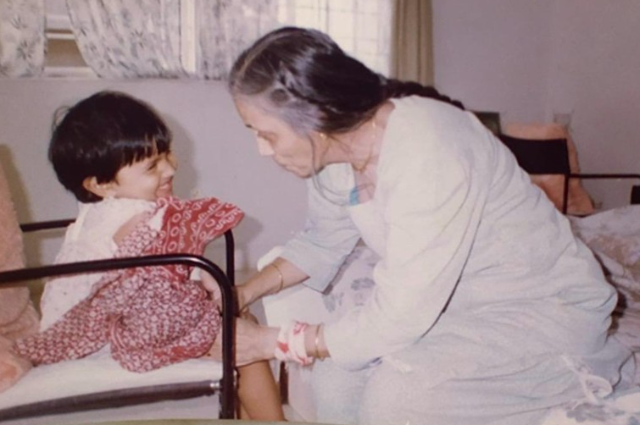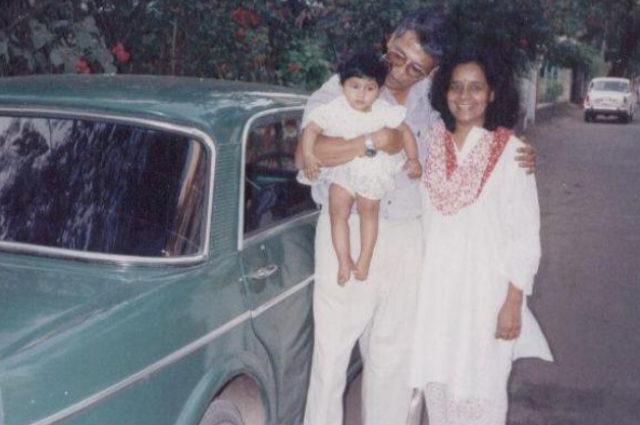
It was 12:51 in the morning, and a mother had just delivered. There she was, a cute baby girl. But during the night, something happened, and at just two weeks old, she was put up for adoption.
There was a couple that had been married for about ten years. They had just built a new house with all their life savings, and the husband was proud of what he had built. Soon, the family moved in. His parents and hers. A handsome, young Alsatian named Sheeba joined their circle. For a while, it was a dream. Perched by the bottom of a hill, a sanctuary for birds and animals as well. However, they both knew, deep down, that something was missing. They wanted a child. A girl child. Adoption was on their mind. And so, they visited the Bhartiya Samaaj Seva Kendra (BSSK) – an adoption agency supporting children and prospective parents. Looking at all the children, they felt overwhelmed. How should they choose? But suddenly, a baby girl smiled. Their eyes met. A sudden connection. And thus, she was adopted.
That baby was me. And over the years, I’ve come to see how the language around my adoption often shaped how others perceived my story—and sometimes, how I perceived myself. Even though my story began with love, I’ve often heard phrases like ‘given up’ or ‘not her real child.’ Words that sting—not because they reflect truth, but because they don’t.
So, let’s talk about the language of adoption—what uplifts, what hurts, and what needs to evolve.
Language matters deeply in adoption. The words we choose don’t just describe an experience; they shape how it’s understood and felt. In the context of adoption, language influences how adoptees view themselves, how adoptive and birth parents are perceived, and how society defines what makes a family. Respectful, thoughtful language can foster empathy, belonging, and healing. On the other hand, outdated or careless terms can reinforce stigma, perpetuate misunderstanding, and quietly suggest that adoption is somehow “less than” the biological norm.
The stigma isn’t always obvious, until it lands right in your lap, disguised as a casual comment.
“Adoption”, this word itself was once that caused a relationship breakup with my ‘could have been husband’. Unlucky in love, I asked my parents to look for someone for me. I was about to hit my thirties. I was desperate. All my friends were either getting married or having babies and settling down. I was scared. Alone. And so, my parents got to searching. Within a month, a friend of my mom’s approached us with a ‘rishta’. We hit it off, talking about various things every day. Unfortunately, he was ten years older to me and wanted to settle down as soon as possible.
Our conversations soon turned towards marriage and kids. I told him that I was not in a hurry to get married. I wanted to date him for at least a year, but then, unexpectedly, our conversation turned toward children. He asked me if I wanted children. I told him that I would prefer to adopt and that I didn’t want to go through the whole pregnancy process. As an adoptive child, I strongly felt the need to adopt at the time. But I didn’t discourage the thought of being pregnant either. As soon as I brought up adoption, I was horrified with his reply. He said, “How can an educated and liberal girl like you want to adopt?”
Oh, how those words hung over me for days. It was over. That conversation didn’t just end a potential relationship—it exposed something deeper. It reminded me how powerful words can be, especially when it comes to adoption. The problem isn’t just ignorance but it’s the everyday language we’ve normalized, often without realizing how loaded it is. And when these words go unchallenged, they quietly shape how adoption is viewed and valued.
The way people talk about adoption often carries unspoken judgment, even when the intention isn’t to hurt. One phrase that still makes me cringe is “real parents.” Many people over the years have asked me, “Do you know your real parents?” As if the ones who raised me, loved me, stayed up nights with me, don’t count. The better term is “biological” or “birth parents.” It’s accurate, and more importantly, it doesn’t diminish the role of adoptive parents.
Then there’s the phrase “given up for adoption,” which makes it sound like the child was unwanted or discarded. Most birth parents don’t “give up” their children. They make a painful, considered decision, often out of love. Saying “placed for adoption” or “made an adoption plan” respects that complexity.
I’ve also been called an “adopted child,” even as an adult. It’s strange, no one says “biological child” every time they talk about someone else’s kid. Constantly qualifying someone as “adopted” can create an unnecessary sense of otherness. I’m just a daughter. Adoption is a part of my story, but it doesn’t need to be a label that follows me forever.
Even the difference between saying someone “was adopted” and “is adopted” matters. Adoption is a legal event that happened in the past. It doesn’t define someone’s present identity unless they choose it to. These subtleties may seem small, but they shape the way we see families, belonging, and worth.

When it comes to labels, "Adoptive parents" is another one that separates parents into categories like "real" parents vs "adoptive" parents. Parents are parents, full stop. Also, the term “adopted family” can create an unnecessary divide, suggesting that adoptive families are somehow “different” from biological families. The truth is, family is family, no qualifiers needed. Whether biological or adoptive, what makes a family is the love, care, and commitment that bind its members together. Simply calling it “family” reflects the reality of the relationship without any need for labels that separate us.
I may not have your eyes, but I have your heart. Language shapes how we view adoption, families, and the people involved. When we choose a language that reflects love, respect, and inclusion, we foster a deeper understanding of what family truly means. Adoption is not a second choice, nor is it a lesser path - it’s a powerful and beautiful way to build families.
So, let’s choose our words carefully, and affirm the realness, validity, and beauty of every family formed through the process of adoption.
